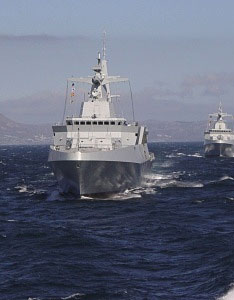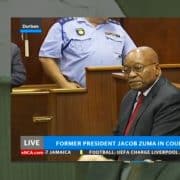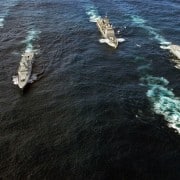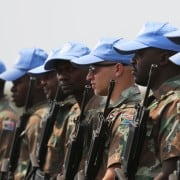|
Getting your Trinity Audio player ready...
|
 Judge Willie Seriti has been given another five months in which to finish investigating bribery, corruption and other acts of impropriety which might have happened during the acquisition of prime mission equipment for two arms of the South African National Defence Force in 1999.
Judge Willie Seriti has been given another five months in which to finish investigating bribery, corruption and other acts of impropriety which might have happened during the acquisition of prime mission equipment for two arms of the South African National Defence Force in 1999.
President Jacob Zuma said in a statement released last Friday that, “the term of the Commission of Inquiry into allegations of fraud, corruption, impropriety or irregularity in the strategic defence procurement package has been extended until April 30, 2015”.
The statement also points out that the commission was established in November 2011 and its term was “recently extended to November 30, 2014”.
The commission was originally given 12 months to finish its investigations and present a report to Zuma six months after its work was finished. In November last year Zuma gave the commission another 12 months and now he has added a further five to its mandate.
The commission is still bound to submit its report within six mionths of wrapping up.
Witnesses treated unfairly by commission
According to the Arms Procurement Commission website, public hearings will “commence on November 10. The witness to take the stand is Mr Shamin ‘Chippy’ Shaik, followed by Admiral Alan Green and Mr Masizakhe Zimela on November 12”.
The Seriti Commission was thrown into disarray last month after Hennie van Vuuren, one of three witnesses who withdrew from the commission, took to the stand and said: “I respectfully decline to testify”.
Witnesses Andrew Feinstein and Paul Holden also withdrew from the commission and were re-subpoenaed. Reports indicate they will not be appearing before the commission as they reside outside South Africa and Holden maintains his subpoena never arrived. Feinstein, through his lawyer, Advocate Geoff Budlender, told the commission it did not have international jurisdiction.
Van Vuuren issued a statement through Lawyers for Human Rights to explain his reasons for keeping mum on the Seriti Commission witness stand. These are being refused access to evidence; being refused the opportunity to provide the commission with “crucial” documentary evidence; not being allowed to speak to documents witnesses have not written, and the loss of public trust in the commission and its work.
“There is evidence to suggest the commission is following a second agenda, namely, to discredit critical witnesses and find in favour of the State and arms corporations’ version of events.
“Since January 2013 at least four senior staff have resigned in protest at the commission’s conduct. In August 2014, two senior evidence leaders resigned from the commission, saying its approach ‘nullifies the very purpose for which the commission was set up’. The commission has called only two people to testify, of the dozens who have been directly implicated in impropriety. Most recently almost 40 civil society organisations have called for the commission to be disbanded.”
“If we’re committed to stopping corruption in SA, our institutions have to be seen to be working. When they fail us, it’s our responsibility to challenge these institutions," Van Vuuren told Corruption Watch last month. “I am not going to give legitimacy to a process that is extremely flawed.”
Commission spokesman William Baloyi noted that it is a criminal offence for a subpoenaed witness to refuse to testify and a prison term with an option of a fine could be imposed but it is not clear what, if any, punishment van Vuuren could face.
Commissioners will do their utmost to fulfil mandate
Seriti told defenceWeb in September the commission had done “fairly well and overcome whatever problems it encountered”, including resignations. “It has not even been necessary to replace the departed employees. I am confident we will complete our mandate expeditiously and present a thorough report to the president come next year. The commissioners are fully aware of the heavy responsibility resting on their shoulders in this regard and are determined to do their utmost to carry out their mandate,” Seriti said.
“The commission has amassed evidence whose record runs into thousands of typed pages, having heard over 40 witnesses. The resignations have certainly not impeded its work as we now have a leaner, meaner and more efficient staff complement.”
Seriti also said the “the negative ranting of some so-called arms deal experts” had been a challenge. Van Vuuren told Corruption Watch that the performance of some arms deal critics, notably Crawford-Browne, had not advanced the investigation much as Crawford-Browne had “gone on a tangent and focused on gossip” instead of the “evidence”. Crawford-Browne testified there were allegations that Chris Hani’s assassination came before he planned to expose then defence minister Joe Modise’s involvement in, and corruption relating to, the arms deal and that Hani’s killer was employed by BAE Systems.
Regardless of Crawford-Browne’s testimony, Van Vuuren said arms deal critics were not the ones on trial and that the commission should focus on investigating the arms companies, former president Thabo Mbeki, cabinet ministers and others involved in the deal that saw the acquisition of 26 Gripen jet fighters, 24 Hawk lead-in fighter trainers, 30 Agusta A109 light utility helicopters, four Super Lynx maritime helicopters, four Valour Class frigates and three Type 209 Heroine Class submarines.
One of the more interesting witnesses scheduled to appear this year is Fana Hlongwane, advisor to former (now deceased) defence minister, Joe Modise. BAE Systems in 2011 admitted to irregularly using a South African joint venture with Saab, which manufactures the Gripen, to channel R24-million to a "South African consultant" – Hlongwane. As a result, BAE agreed to pay a record US$79-million (R550-million) fine.
BAE and Hlongwane have not denied the fact of the payments, but have denied that they were bribes.
• First published on defenceWeb









